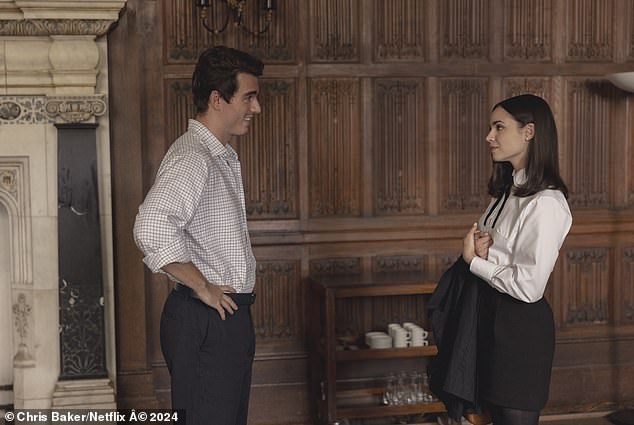When Netflix dropped its new romantic comedy My Oxford Year on August 1, the streaming giant probably expected cozy vibes, sweeping love scenes, and plenty of swooning from viewers.
Instead, the film has become a talking point for all the wrong reasons — sparking debates about power dynamics, consent, and whether certain love stories should even be told in the same lighthearted way as a fairy tale.
A Story That’s Raising Eyebrows
The movie, based on Julia Whelan’s 2017 novel, stars Sofia Carson and Queen Charlotte breakout Corey Mylchreest.
It follows Anna, an ambitious young American who arrives at Oxford University with her life meticulously planned — including a future at Goldman Sachs.
But things take an unexpected turn when she crosses paths with Jamie, a witty local who just happens to be… her lecturer.
That detail has been the lightning rod for criticism.
While the film leans into the charm and romantic tension, many viewers — especially those with academic experience — say it sends the wrong message.
A Real Student’s Refusal to Watch
One of the most vocal critics is Kaelyn Grace Apple, a current PhD candidate at Oxford.
She posted a now widely shared video titled Stop Romanticizing Student/Professor Relationships, making it clear she’s boycotting the film.
Apple’s reasons are deeply personal.
In 2019, she says she experienced sexual harassment from a lecturer who was supposed to be her mentor.
That experience, coupled with her activism to change outdated university policies that once allowed such relationships, fuels her disapproval.
The Consent Problem No One Can Ignore
In her video, Apple points out that in the novel, Jamie defends the romance by saying Britain isn’t “a nation of Puritans” about relationships between consenting adults.
But Apple argues that consent in these situations is far from simple.
She explains that when one party holds authority over the other — in this case, control over grades, reputation, and future opportunities — the power imbalance can easily make the relationship exploitative.
She recalls filing a harassment claim against her professor, supported by other academics and students, and says seeing such dynamics portrayed as “romantic” feels deeply concerning.
A Different Spin in the Movie
Interestingly, Netflix’s adaptation doesn’t dwell on the student–professor issue in its marketing.
This might be because Carson, 32, and Mylchreest, 27, appear close in age.
Instead, the film pivots to another emotional twist — Jamie is battling cancer, and the couple must navigate their love knowing it’s destined to be cut short.
For Carson, who also served as executive producer, the draw was the sweeping, old-school romance vibe, likening it to classics like Love Story and The Way We Were.
On CBS Mornings, she said the love between Anna and Jamie felt timeless and beautiful.
Viewers Share Their Own Stories
Despite the film’s solid performance on Netflix — it ranked third most popular on Sunday — several women have taken to Apple’s Instagram to share their discomfort.
One fellow PhD student said she recently had to report an abuse-of-power case and found the film’s premise unsettling.
Another said it could make students less likely to see lecturers as professionals, calling it “a lose-lose situation.”
Others expressed outright shock, pledging to join the boycott in solidarity with campaigns like Transforming Silence.
Why the Debate Isn’t Going Away
Whether viewers see My Oxford Year as a tender love story or a problematic fantasy, the conversation it’s sparking touches on bigger issues — how media portrays consent, where we draw the line in power-imbalanced relationships, and the responsibility storytellers have in shaping cultural norms.
The movie may fade from Netflix’s top charts eventually, but for those who have lived through the kinds of experiences Apple describes, the discomfort lingers far longer than any box office buzz.
